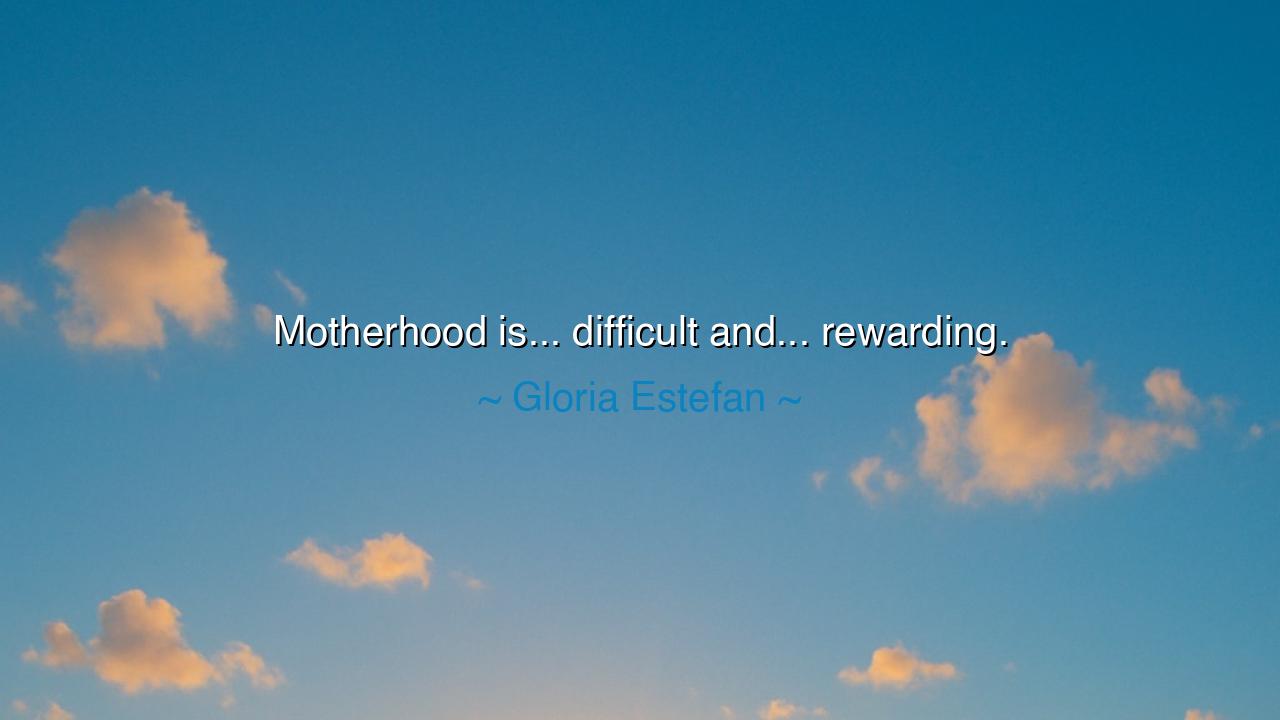
Motherhood is... difficult and... rewarding.






Hear the words of Gloria Estefan, the songstress whose voice carried across nations: “Motherhood is… difficult and… rewarding.” In this utterance, she names the eternal paradox of life itself—that the highest labors are the heaviest burdens, and the sweetest joys are often born through pain. Her words echo like the voices of the ancients, who knew well that no crown is without its weight, and no harvest is without its toil. Motherhood is at once a crucible and a crown, a battlefield of the heart and the triumph of love.
For what is difficult? It is the sleepless nights, the anxious prayers, the sacrifices unseen by the world. It is the mother who carries not only the body of the child but also the destiny of that soul within her own spirit. The ancients compared the mother to the earth, tilled and pressed, yet ever bringing forth life. Her difficulty is not weakness but strength refined, as iron is hammered upon the forge. Without the weight, there can be no shaping; without the pain, there can be no birth.
And what is rewarding? It is the first cry of the infant, the first step upon uncertain feet, the first word spoken into the air. It is the joy of seeing life continue, of watching a being who once dwelled in her womb walk forth into the world as a flame carrying her light. It is the knowledge that her sacrifices, invisible though they may be, are the foundation upon which the future is built. The ancients understood that every great civilization is not held together by kings alone, but by the mothers who raised them.
Consider the tale of Cornelia, the Roman matron, mother of the Gracchi brothers. When shown the jewels of other noblewomen, she presented instead her sons and declared, “These are my jewels.” Though their lives were marred by political strife and tragedy, Cornelia’s legacy endured as a model of virtue and devotion. Her motherhood was both difficult and rewarding—difficult in the trials of raising sons in a time of turbulence, rewarding in knowing that her love shaped men who would change Rome forever.
So too do we see this truth in the life of modern mothers, whose labors may not be sung by poets, yet whose sacrifices sustain the world. A mother bends her will to protect her children, gives her strength so that they may stand, and hides her tears so that they may smile. Her difficulty is great, yet in those same difficulties she finds meaning deeper than the treasures of kings. It is this paradox Estefan names: that love is heaviest where it is most precious.
The lesson for all who hear is this: honor the weight and the glory of motherhood. Do not measure it by ease, for it is not easy. Do not measure it by perfection, for it is imperfect. Instead, see it as the union of labor and love, of sacrifice and fulfillment. The difficult path is also the rewarding one, for in it lies the secret of life itself—giving without expectation, loving without limit, enduring without end.
Practical actions follow naturally from this wisdom. If you are a child, cherish your mother, for she bore the difficulty of your life long before you knew it. Speak gratitude, not only in great gestures but in small words. If you are a parent, embrace the hardships as stepping stones to the rewards. In the sleepless nights, remind yourself that you are forging a legacy. And for those yet to walk this path, prepare your heart with reverence, for it is not a task of convenience but of sacred calling.
Let the teaching be carried forward: that motherhood is the great paradox, both trial and triumph, both weight and crown. It is the proof that love can endure hardship and emerge not broken, but magnified. And those who embrace this path, though they walk through fire, will hold in their arms the purest treasure of all—the living testimony of love’s reward.






AAdministratorAdministrator
Welcome, honored guests. Please leave a comment, we will respond soon